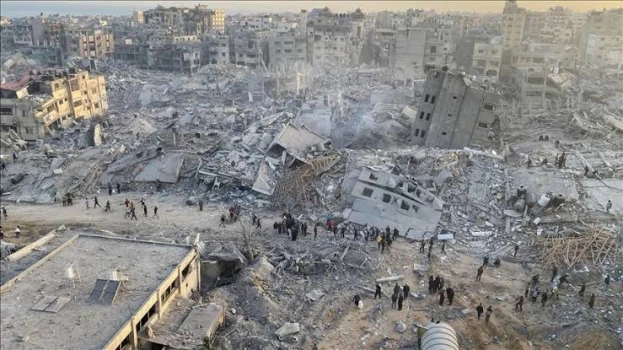|
Date: 2025-04-08 11:14:03 |
Devastated Gaza: Where is Global Humility?
 One of the most discussed and brutal events in the current world is the destruction of the Gaza Strip. Today's image of Gaza is a glaring example of a humanitarian catastrophe. This small piece of land in Palestine, long afflicted by violence, oppression, and continuous Israeli attacks, has now turned into rubble. Every day, the land of Palestine bleeds. Buildings are collapsing one after another, thousands of innocent Palestinian lives are being lost, and the air is heavy with the heart-wrenching cries of children. Women, children, and ordinary people are falling prey to death on a daily basis. Yet, the most shocking and heartbreaking aspect of this unbearable situation is the silence of most world powers—particularly the inadequate response from the Muslim world. Where is global humanity today?
The Israeli aggression began on October 7, 2023, and it is the children of Gaza who have suffered the most. According to Hamas, nearly 19,000 children have been killed so far, including 274 newborns and 874 infants under one year old. Many children have also died from cold, hunger, and malnutrition. Around 39,000 children have lost their parents and become orphans. Gaza has now turned into the largest orphanage of modern times. One might say Gaza is the largest graveyard in the current world.
The silence of the global community and international inaction is further emboldening Israeli aggression. Since March 2, no aid has entered Palestine, resulting in an acute shortage of food and water. Hospitals, ambulances, and medical centers are being targeted. Even journalists and Red Crescent workers have been killed. There is no safety for human life. Over the past 17 months, more than 100,000 tons of bombs have been dropped on Gaza, rendering it completely uninhabitable. Journalists are also being removed so that the rest of the world remains unaware of the true situation.
The unconditional support from the United States reveals that this is not just a war, but a planned genocide. So far, 50,669 Palestinians have been killed—though the actual number is likely much higher. There are over 50 Muslim-majority countries in the world, yet in response to this ongoing humanitarian disaster in Gaza, most reactions have been limited to formal statements. No effective diplomatic efforts or unified resistance have emerged.
While some European countries have recognized Palestine as an independent state, Europe overall has taken a stance in favor of Israel, thus allowing the conflict to persist. Another major reason is the United Nations' failure to play an effective role in resolving the Palestinian crisis. The misuse of veto power and biased behavior in the Security Council have played a key role in enabling Israeli occupation to continue.
Political and religious divisions among Middle Eastern countries complicate any unified response to the Palestinian issue. It is evident that some Arab nations are seeking to normalize relations with Israel, which has affected their support for the Palestinian cause. Countries’ positions on the Israel-Palestine conflict are influenced by their political and economic interests. For example, the United States has long been a staunch ally of Israel, which obstructs support for Palestine. This is why much of the international community remains silent—many states are preoccupied with their own political and economic interests, while others maintain silence to preserve their ties with Western powers.
The main patrons of Israeli aggression are the United States, the European Union, and their Western allies. The U.S. provides Israel with about $3.8 billion in military aid every year and has repeatedly vetoed ceasefire proposals in the United Nations. While the Muslim world has failed to take effective action, some countries like South Africa, Malaysia, and a few others have taken diplomatic steps, but they have not been enough to change the situation.
A united international effort is needed to resolve the brutal situation in Gaza. Humanitarian aid for the people of Gaza must be ensured. Alongside state-level initiatives, the active role of ordinary people, civil society, and religious organizations is essential—otherwise, this tragedy will never end. We do not want to see the bloodied bodies of Palestinians anymore. We want Palestine to soon regain its own land. Since the Palestinian crisis is a complex and long-standing issue, effective global action is urgently required for its resolution.
Sakibul Hasan
Department of Sociology
Dhaka College, Dhaka
sakibulhasanlearning@gmail.com
One of the most discussed and brutal events in the current world is the destruction of the Gaza Strip. Today's image of Gaza is a glaring example of a humanitarian catastrophe. This small piece of land in Palestine, long afflicted by violence, oppression, and continuous Israeli attacks, has now turned into rubble. Every day, the land of Palestine bleeds. Buildings are collapsing one after another, thousands of innocent Palestinian lives are being lost, and the air is heavy with the heart-wrenching cries of children. Women, children, and ordinary people are falling prey to death on a daily basis. Yet, the most shocking and heartbreaking aspect of this unbearable situation is the silence of most world powers—particularly the inadequate response from the Muslim world. Where is global humanity today?
The Israeli aggression began on October 7, 2023, and it is the children of Gaza who have suffered the most. According to Hamas, nearly 19,000 children have been killed so far, including 274 newborns and 874 infants under one year old. Many children have also died from cold, hunger, and malnutrition. Around 39,000 children have lost their parents and become orphans. Gaza has now turned into the largest orphanage of modern times. One might say Gaza is the largest graveyard in the current world.
The silence of the global community and international inaction is further emboldening Israeli aggression. Since March 2, no aid has entered Palestine, resulting in an acute shortage of food and water. Hospitals, ambulances, and medical centers are being targeted. Even journalists and Red Crescent workers have been killed. There is no safety for human life. Over the past 17 months, more than 100,000 tons of bombs have been dropped on Gaza, rendering it completely uninhabitable. Journalists are also being removed so that the rest of the world remains unaware of the true situation.
The unconditional support from the United States reveals that this is not just a war, but a planned genocide. So far, 50,669 Palestinians have been killed—though the actual number is likely much higher. There are over 50 Muslim-majority countries in the world, yet in response to this ongoing humanitarian disaster in Gaza, most reactions have been limited to formal statements. No effective diplomatic efforts or unified resistance have emerged.
While some European countries have recognized Palestine as an independent state, Europe overall has taken a stance in favor of Israel, thus allowing the conflict to persist. Another major reason is the United Nations' failure to play an effective role in resolving the Palestinian crisis. The misuse of veto power and biased behavior in the Security Council have played a key role in enabling Israeli occupation to continue.
Political and religious divisions among Middle Eastern countries complicate any unified response to the Palestinian issue. It is evident that some Arab nations are seeking to normalize relations with Israel, which has affected their support for the Palestinian cause. Countries’ positions on the Israel-Palestine conflict are influenced by their political and economic interests. For example, the United States has long been a staunch ally of Israel, which obstructs support for Palestine. This is why much of the international community remains silent—many states are preoccupied with their own political and economic interests, while others maintain silence to preserve their ties with Western powers.
The main patrons of Israeli aggression are the United States, the European Union, and their Western allies. The U.S. provides Israel with about $3.8 billion in military aid every year and has repeatedly vetoed ceasefire proposals in the United Nations. While the Muslim world has failed to take effective action, some countries like South Africa, Malaysia, and a few others have taken diplomatic steps, but they have not been enough to change the situation.
A united international effort is needed to resolve the brutal situation in Gaza. Humanitarian aid for the people of Gaza must be ensured. Alongside state-level initiatives, the active role of ordinary people, civil society, and religious organizations is essential—otherwise, this tragedy will never end. We do not want to see the bloodied bodies of Palestinians anymore. We want Palestine to soon regain its own land. Since the Palestinian crisis is a complex and long-standing issue, effective global action is urgently required for its resolution.
Sakibul Hasan
Department of Sociology
Dhaka College, Dhaka
sakibulhasanlearning@gmail.com


প্রকাশক : কাজী জসিম উদ্দিন | সম্পাদক : ওয়াহিদুজ্জামান
© Deshchitro 2024

